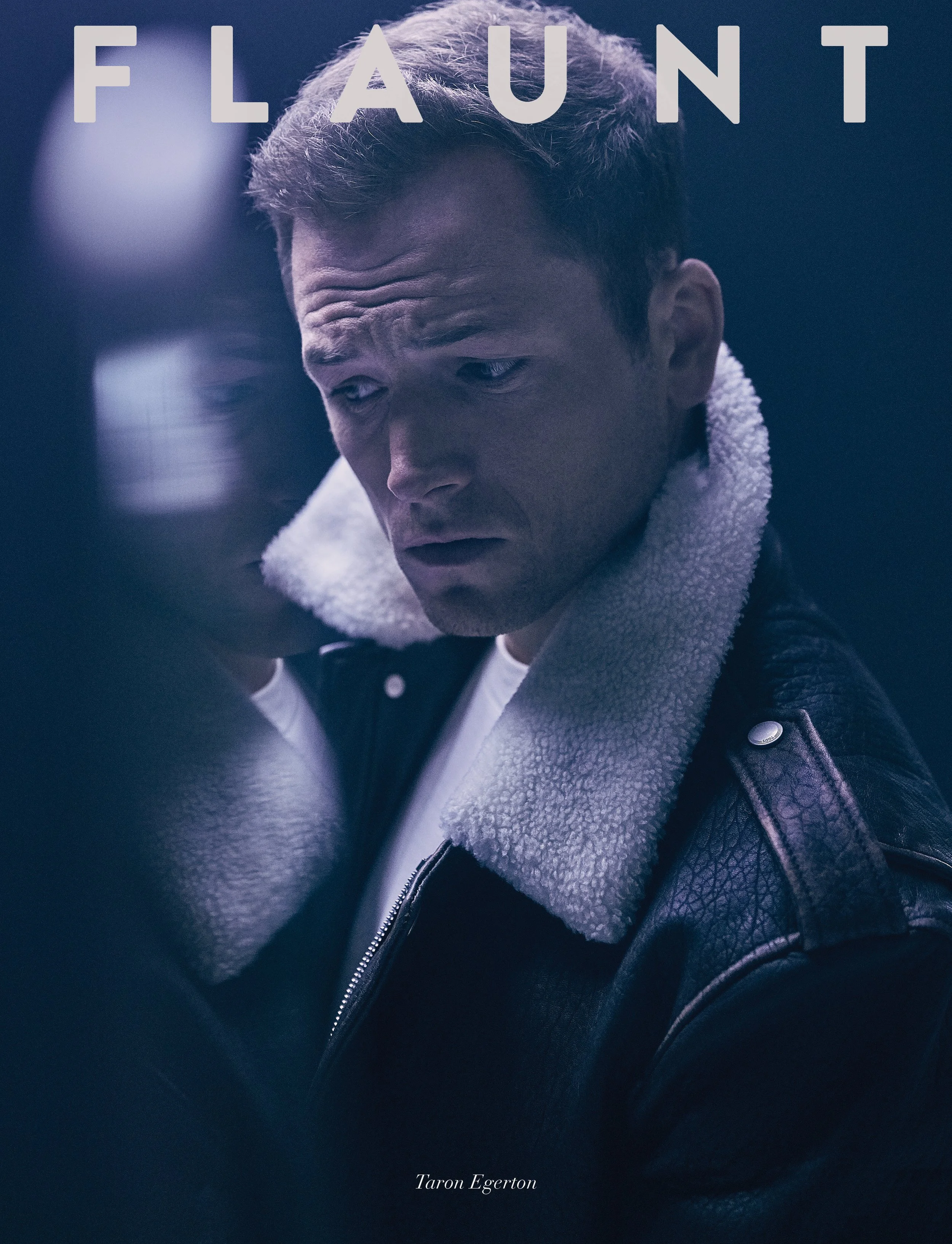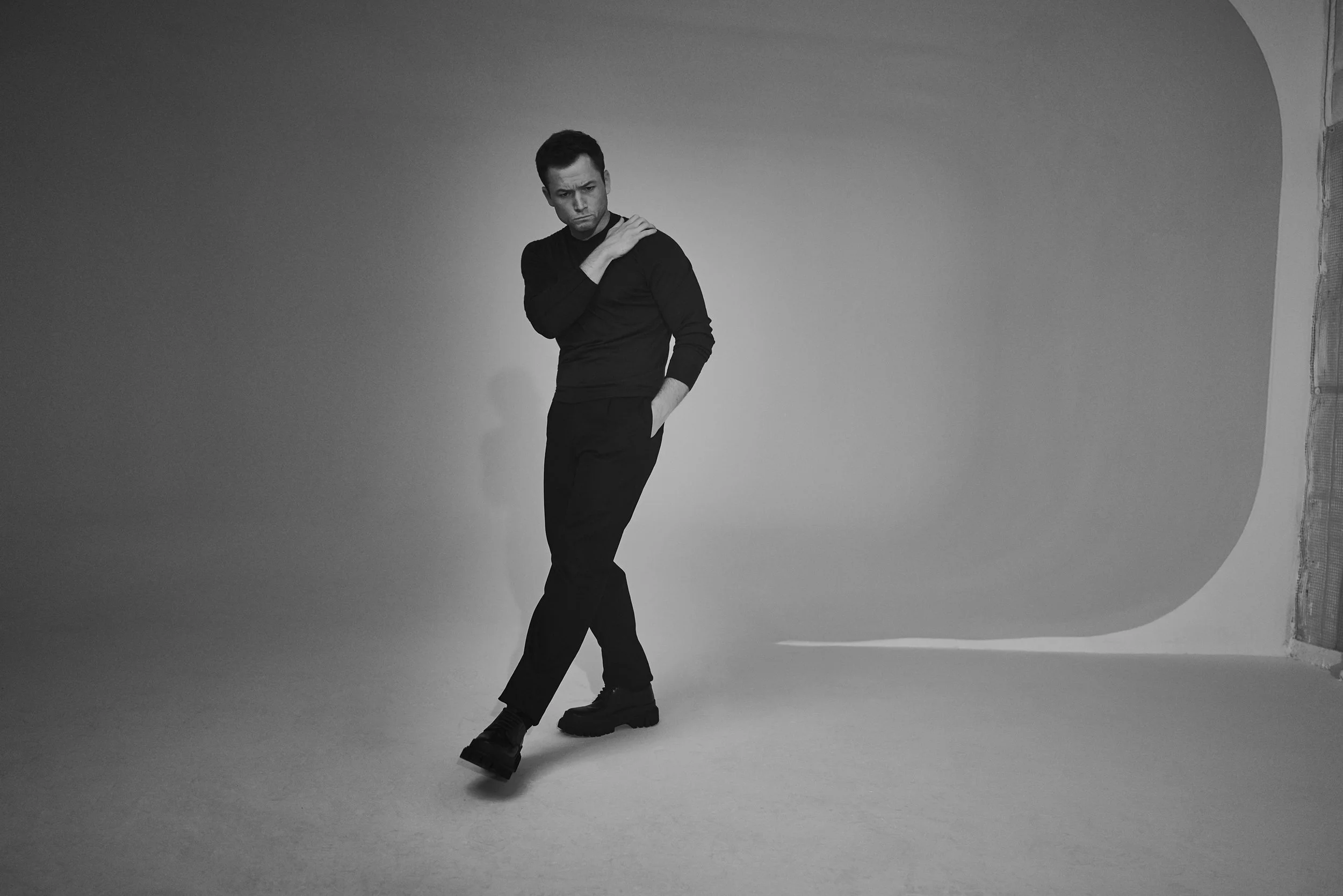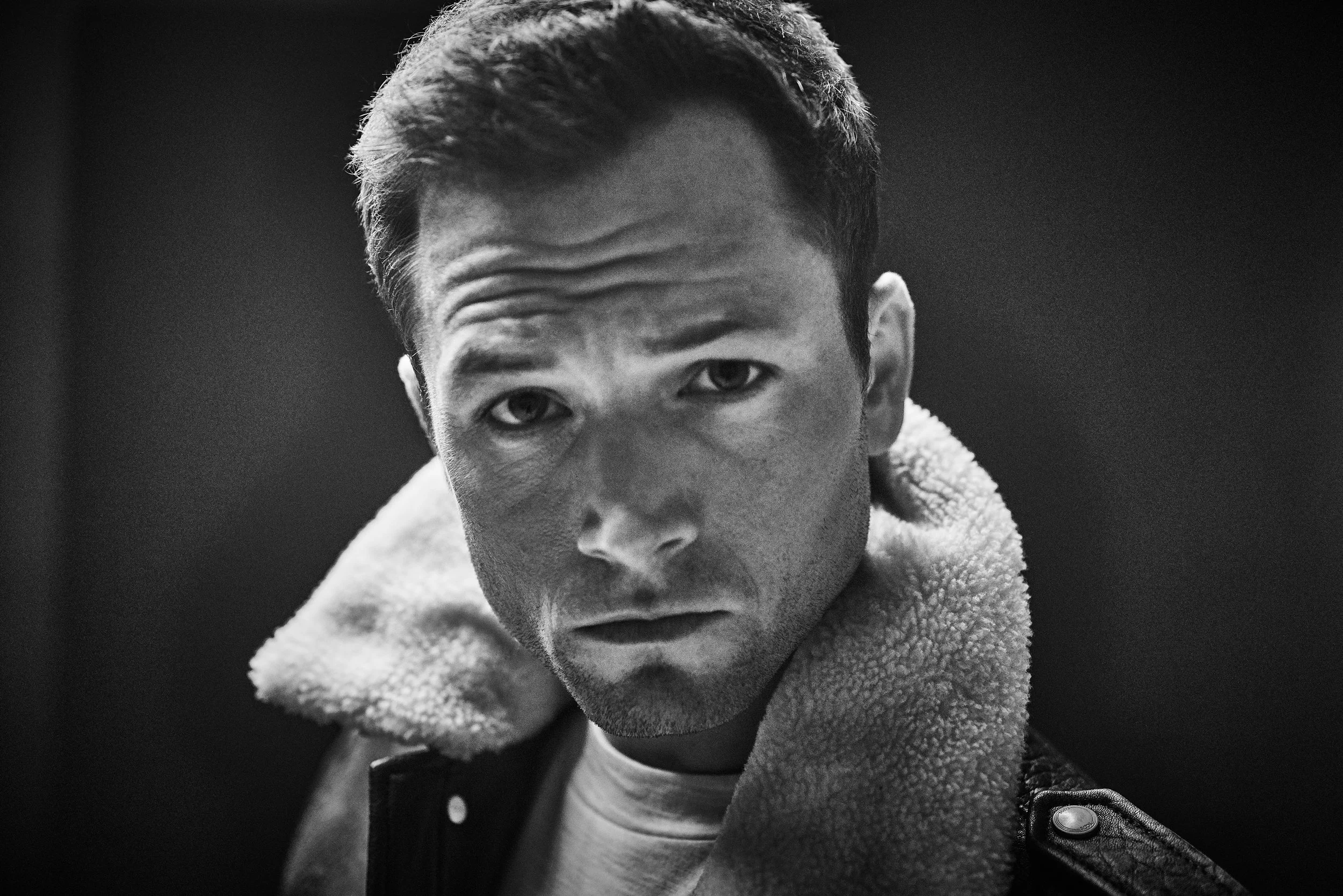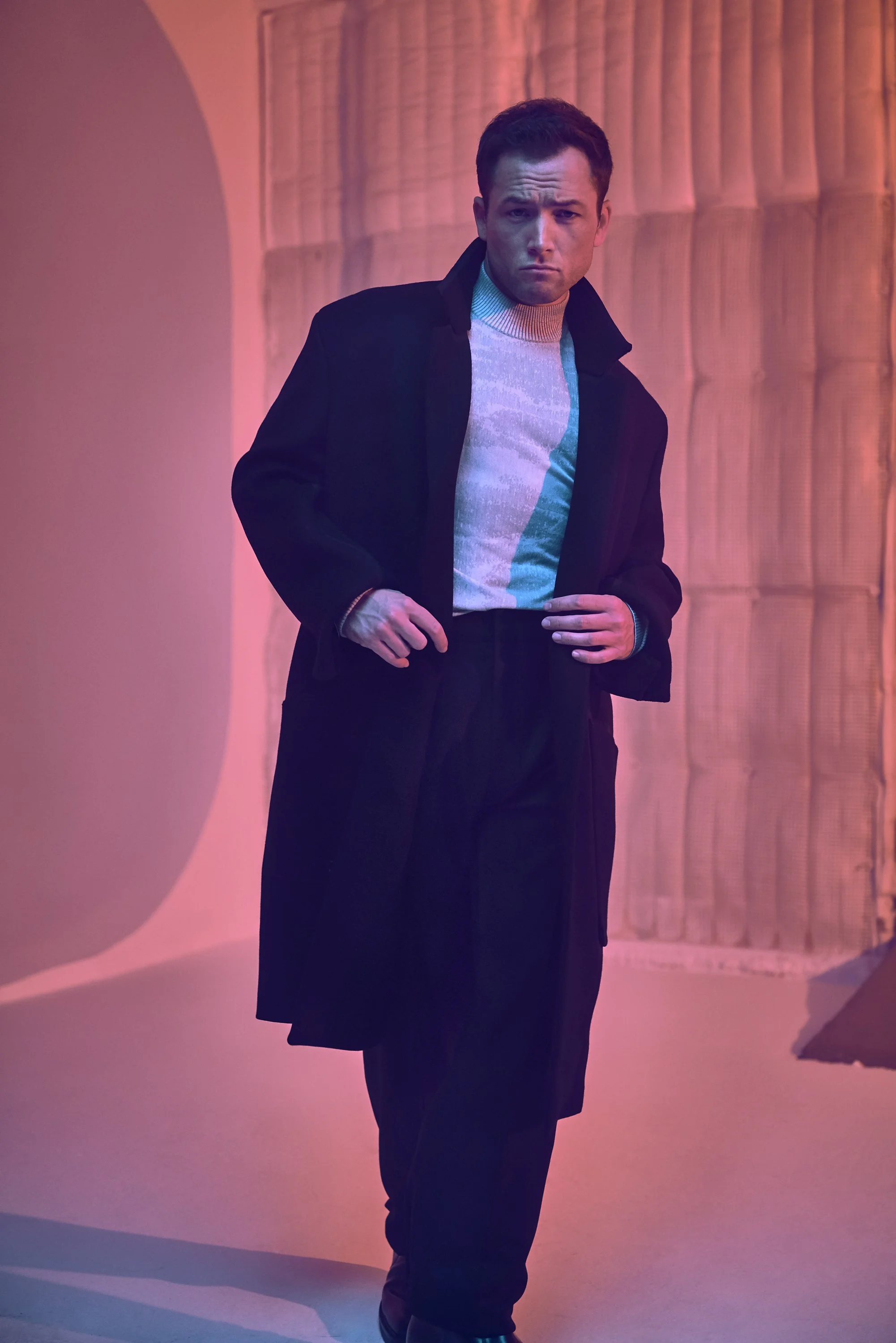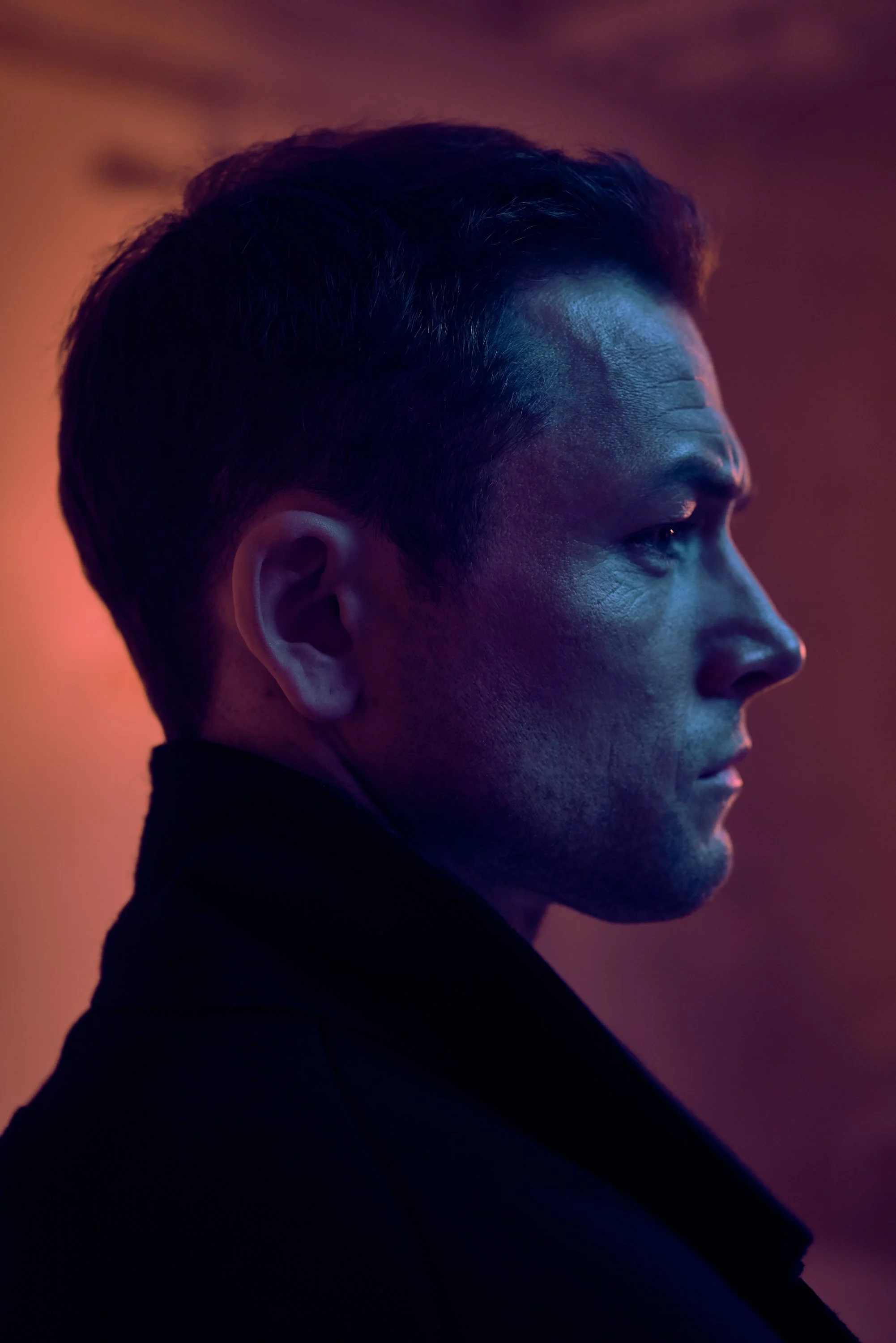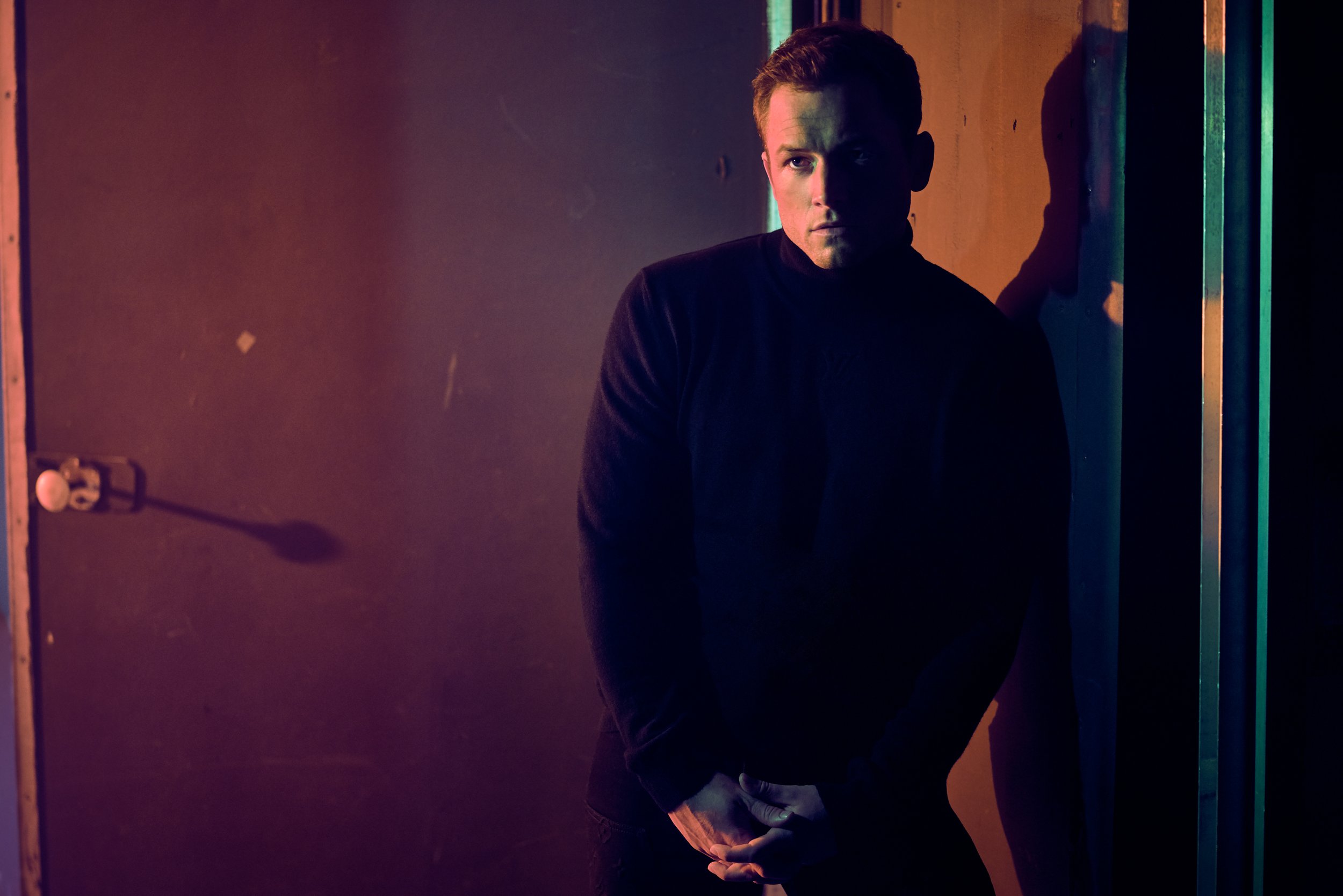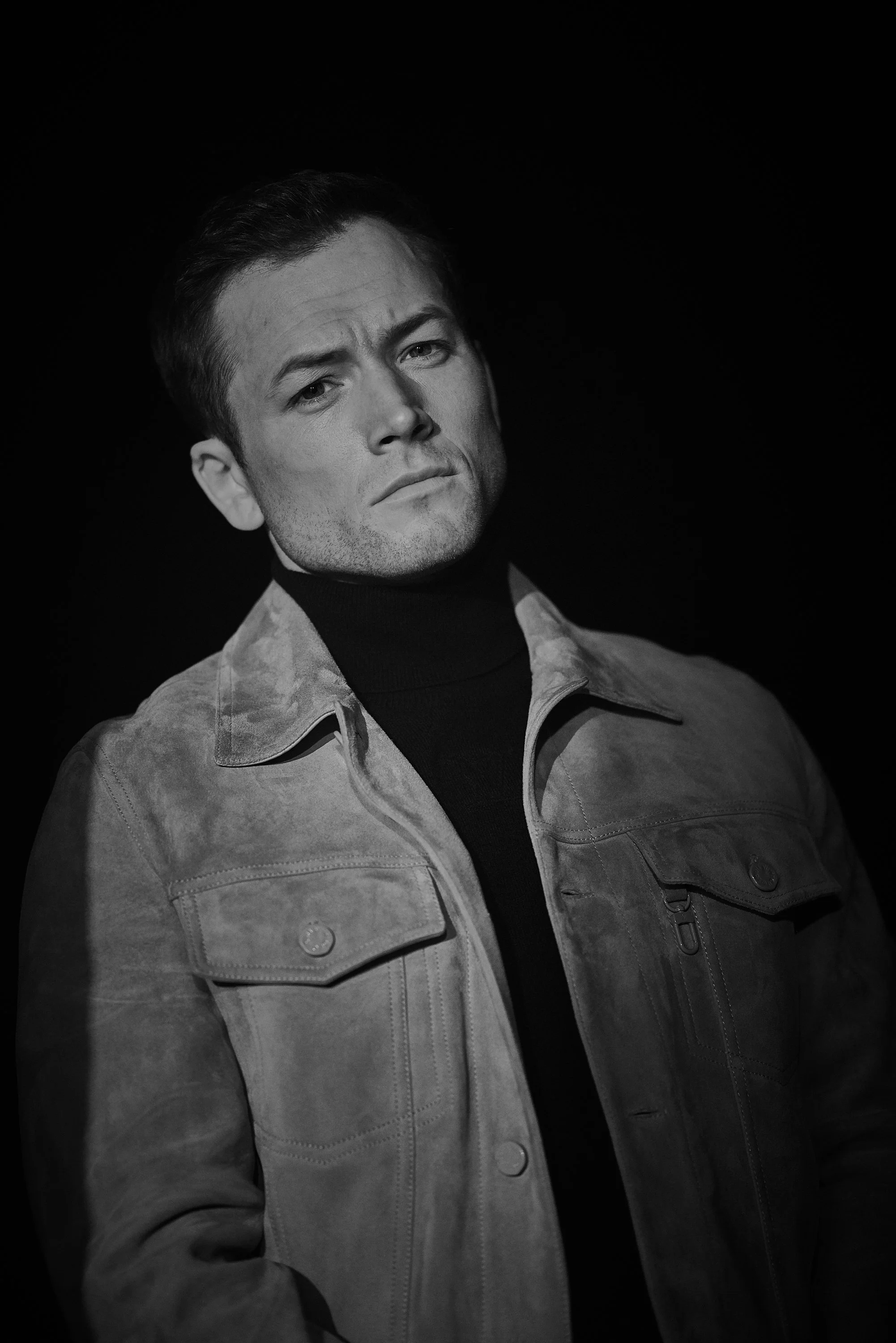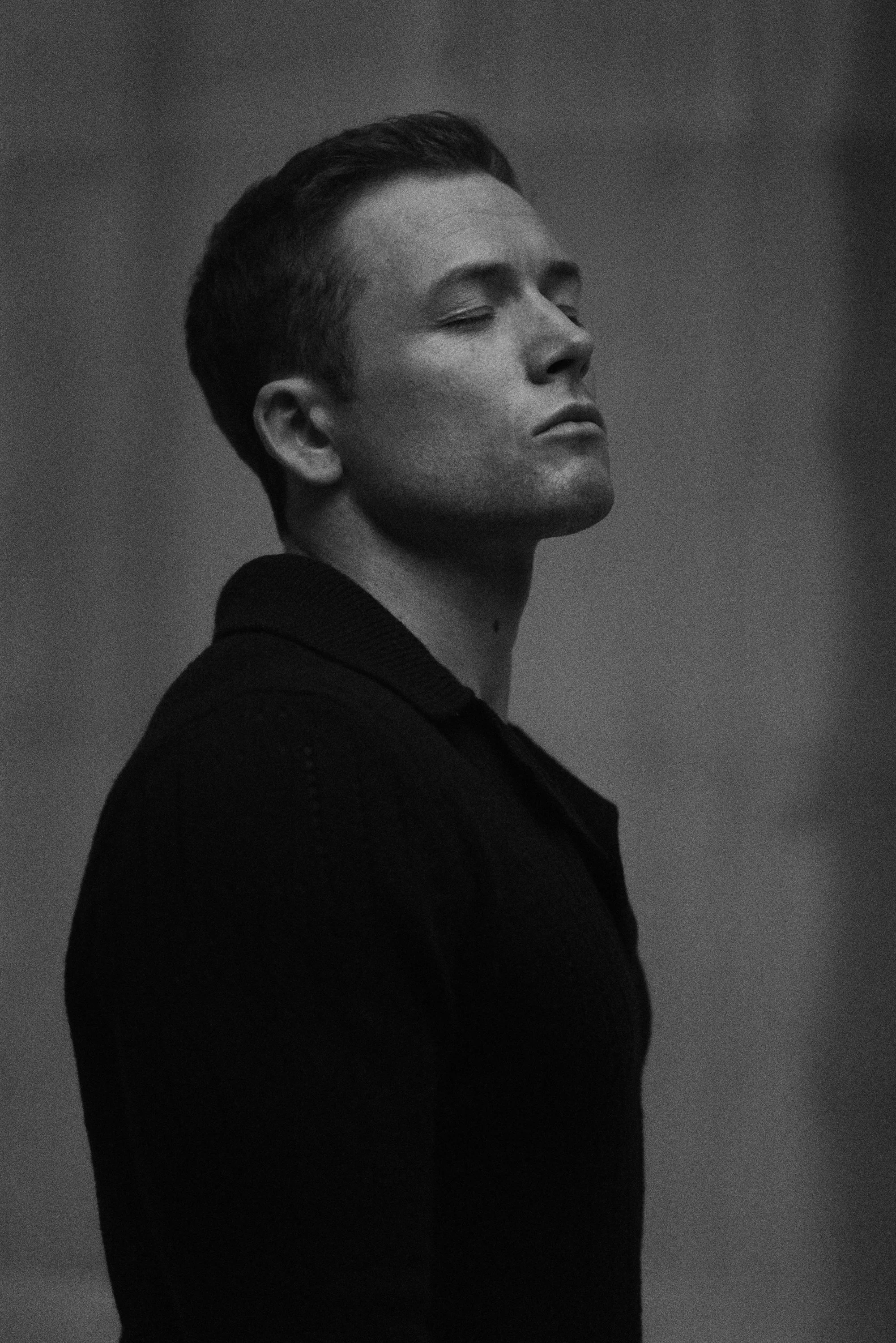Taron Egerton | Paint It Black
by John-Paul Pryor
TOD’S jacket and KING & TUCKFIELD shirt.
When I arrange to meet Taron Egerton in London’s Soho at the legendary Café Boheme, it’s a good three years and one global pandemic on from our last interview for Flaunt, in which we unpacked the role in Rocketman that catapulted him to international fame. I’m sipping on a very strong coffee when he arrives, having spent the early hours watching the entirety of the gripping six-part mini-series Black Bird, which is kind of like saying I’ve just recovered from an excoriating emotional experience. Egerton’s debut outing as executive producer, now streaming via Apple TV+, and his first piece of work since portraying Elton John, is a genuinely pitch-black dramatization of the true story of James “Jimmy” Keene—an imprisoned drug dealer offered his freedom by the FBI if he agrees to transfer to a maximum security penitentiary for the criminally insane and befriend a man convicted of killing a 15-year-old girl, who they firmly believe has raped and murdered countless others across the Midwest. Egerton plays the athletic and charismatic ladies’ man Keene, whose life pre-incarceration revolves around fast cars, hollow sexual encounters and moving hefty quantities of heroin—a lifestyle brutally interrupted when he gets busted and sentenced to ten years in the can, which seems a bad enough fate, until his freedom-pact to get up-close-and-personal with serial killer Larry Hall plunges him into the seventh circle of hell. Adapted for the screen from Keene’s biographical novel by the acclaimed Dennis Lehane, it’s a gritty and uncompromising offering that could not be further from the work Egerton has been known for thus far. Black Bird’s plot to inveigle incriminating details of multiple murders from a monster, in order to make sure he remains behind bars, excavates the darkest psychological corners of humanity.
HERMÈS top and DOLCE & GABBANA pants and shoes.
TOD’S jacket and KING & TUCKFIELD shirt.
“This felt like a really grown up performance—well, me trying to give a grown up performance,” says the actor with characteristic modesty as we order two beers on one of the hottest days of the year so far, in a country that, like most others, is feeling the searing encroachment of climate change. “From the moment you land at Springfield Prison, it’s supposed to feel like you’re in the belly of the beast, and something really appealed to me about that darkness. I’ve loved what I’ve done so far, but I wanted to do something that felt heavier.” he continues, “And they are both such compelling characters. It felt almost like touching the void with the subject matter being what it is, and with what Larry Hall actually is—the absolute darkest of the dark.”
ZEGNA jacket, sweater, and pants and PRADA shoes.
ZEGNA jacket.
It’s no understatement. Hall, who is an Indiana-born gravedigger’s son, was incarcerated in 1995 for the murder of the aforementioned 15-year-old Jessica Roach, and he remains in prison to this day. He is thought to be responsible for the disappearance of up to 40 young women, and has confessed to multiple gruesome murders over the years—confessions he has always subsequently recounted. The brilliant Paul Walter Hauser plays the killer with chilling verve, in a performance that I suggest to Egerton feels consciously emblematic of the grotesque incel culture so prevalent in modern society. “Yeah. That’s what we signed up for—to depict these two guys who were kind of at very different places on a scale of nastiness,” says Egerton. “Dennis took what is an extraordinary story in a kind of nutshell form, where a guy gets his freedom in return for befriending a serial killer, and he made it something which is actually about the male gaze and toxic masculinity. After some of the scenes, where we really got into the nitty-gritty of it all, you felt a bit like you needed to sort of shake it off, you know? It’s dark and heavy, and you feel a bit unclean with it.”
SALVATORE FERRAGAMO sweater.
Egerton’s Keene is no killer, but he is certainly a troubled individual, and is not your typical hero. He is portrayed from the beginning as having an utterly soulless sex life fuelled by capitalist excess, and a difficult and dysfunctional relationship with his father–a not exactly whiter-than-white unreconstructed ex-cop played by the late, great genius Ray Liotta. And his incarceration in Springfield is painted not only as a redemptive journey, but also as psychologically transformative via trauma. “I was always interested in this idea that all these trappings of masculinity my character has are dismantled through his encounter with this malevolent hyper hyper-masculine dark character of Larry,” explains Egerton, when I ask him what drew him to this project above the many others that must have winged their way across his desk in recent years. “Keene is totally repulsed by Larry, but, on a vastly different part of a spectrum, he sort of sees something of a commonality, and begins to recognize something about the commodification of women in his own life—and something about that really fucks him up. You get the sense that he’s maybe never going to be quite the same again after this experience, you know?” Egerton pauses and leans forward suddenly, formulating his thoughts, “My character is not instantly likable. In the beginning, he’s narcissistic, misogynistic, completely self-absorbed, and self-aggrandizing. It’s only through this enforced encounter that all of that starts to break apart. I mean, he’s charming, he’s charismatic, he’s in good shape, he’s got a black belt, and all of that feels quite archetypal, and quite Hollywood, but what is interesting to me is that he gets into this situation and none of those things help him at all. Actually, the way he achieves what he’s been tasked with achieving is to reflect on his own nature, and he is someone who I don’t think has ever reflected on their own nature before.”
BRUNELLO CUCINELLI jacket and sweater, DZOJCHEN pants, and BRUNO MAGLI shoes.
BRUNELLO CUCINELLI jacket and sweater.
It’s important to distinguish between the dramatized Keene and the real man (who remains active in the profiling of serial killers to this day), but it’s this inner-journey that Egerton portrays as he becomes entangled in the nightmarish psyche of his murderous prey that keeps you glued to the show. “I think problematic masculinity has something to do with an unbridled certainty, and an absolute belief in your own perspective—your own viewpoint, your own view of the world,” he says, when I ask him how that journey began to take shape for him when finding his character. “I think what happens to Jimmy is that he’s forced to be introspective, and he learns some humanity through that. His encounters with women are entirely different to Larry’s, of course, because they are consensual. He is not predatory. He is not coercive. But the self-reflection has something to do with him examining his own underlying attitude—the sexual encounters he has are fleeting moments in his life, and as a result, they’re also disposable.” It’s an interesting, if somewhat dark parallel, no matter how far apart on the respective spectrum, and it begs the question as to whether Egerton feels as if men in general still have a long way to go when it comes to ingrained misogyny? “I am loathe to sort of make any really grand statements about the state of the world, and how men fuck it up, but, you know, men are pretty horrible—violence is largely a male quality, and I think the absolute certainty of your ‘rightness’ is a very male thing,” he says. “All of the men in the show are pretty pigheaded and self-absorbed, and acting out of self-interest, aside from the character of Miller, who I think is probably the show’s true north.”
LOUIS VUITTON MEN’S turtleneck and pants.
LOUIS VUITTON MEN’S turtleneck.
Brian Miller, played with brilliantly understated existential angst by Greg Kinnear, is the detective whose resolute and unwavering commitment to solving the murder of Jessica Roach is what initially places Larry Hall behind bars, and, as Egerton points out to me, he is the only man in the show who genuinely welcomes a woman into his sphere as an equal, in the shape of Lauren McCauley, the hard-balling FBI agent who cuts the deal with Jimmy, played by the excellent Sepideh Moafi. I am painfully aware as I pen this that these descriptions are in danger of sounding like crime drama clichés, but I want to be clear that the most engaging thing about Black Bird lies in its originality—which is something of an achievement, considering we’ve seen the serial killer phenomenon explored countless times in cinema. In fact, given the prevalence of ultra-violent murderers providing the axis of so many narratives in Hollywood, I can’t help but suggest to Egerton that serial killers might perhaps be particularly synonymous with American society, and ask him why he thinks that might be. “Fuck. I don’t know,” he says, shaking his head. “It’s a really interesting question. You are asking me about the biggest societal conundrums, aren’t you? The first thing that comes into my head is that America is historically where the culture of the individual has most come from—there is a sense of every man for himself in America, and that you can make your fortune, and maybe it’s something to do with the promise of that not coming good? But I don’t know, you probably can’t really attribute the fact serial killers exist to society, because they’re just out there, you know? Some people are that dark. There’s an interesting question about whether they’re born, whether they’re made, or whether it’s a combination of the two, and I think it is probably the combination. It’s my job as an actor to try and understand why people do certain things when I’m doing it at my best, and I think I would always rather try to understand why someone’s nature is a certain way than simply label them as an archetype,” he continues. “Actually. What I like about the show is that it doesn’t reduce people to archetypes. I don’t think the characters are quintessentially good or quintessentially evil. Jimmy is the hero in inverted commas, but you also have moments when you can hate him.”
LOUIS VUITTON MEN’S jacket and turtleneck.
And perhaps that is the kernel that gives the show its distinctive nature. Black Bird is an incredibly nuanced piece of work, with the line between black and white being far from obvious, and that can be a very difficult space to navigate morally, given that it can all-too-often wind up in the arena of the sensationalized or gratuitous. “I was concerned about that,” says Egerton, when I suggest this to him. “I think there’s obviously a danger, especially with someone who’s done such hideous things, that you can start to almost excuse them, but I don’t feel this show does that. There’s obviously a really difficult line to tread with the commodification of victims of this sort of thing in the storytelling, and there’s a danger of glorifying violence against women, but you don’t ever see the murders in Black Bird. The only element of violence in that regard that you do see comes when Jimmy is dreaming that it’s him doing these things, and I think it’s earned at that point, because it portrays how corrupted he feels by the horror of what he’s heard—he feels contaminated, and infected by it.”
SALVATORE FERRAGAMO sweater.
The dialogue-heavy scenes between the two men are certainly deeply uncomfortable to watch at times, and what is challenging for the viewer is that despite the sickening psychopathic nature at his core, the character of Hall is portrayed in such a way that the viewer might, at times, almost feel begrudgingly sorry for him. “One hundred percent. I think Paul’s performance engenders a very uncomfortable kind of sympathy,” says Egerton. “There are moments of vulnerability. There are moments where he is quite charming. There’s even a moment where he makes Jimmy genuinely laugh. I think there are also times when the relationship between them starts to become evocative of something much bigger.” He continues, with a pause, “There is one scene where he lashes out at me and sort of slams me into the wall, and there was a big conversation on set because everyone was saying to me, ‘You’re supposed to be strong, you’re supposed to be physically able—there should be more of a tussle.’ But I said no, because I believe we are teetering on the edge of something almost supernatural at that point, in the sense that Jimmy has been completely drained by Larry, because of everything that he is going through internally in getting closer to him. He’s fucked at that point, you know?”
TOD’S jacket and KING & TUCKFIELD shirt.
TOD’S jacket.
That’s not to say Egerton’s character is not capable of violence. There is one particularly vicious scene in which Jimmy beats a fellow inmate with a heady mixture of terror, rage, and sadness in his eyes. It’s all a very long way from the kind of balletic ‘action’ violence Egerton is know for on-screen in the Kingsman franchise, and I ask him how he feels in general about the spectacle of violence as entertainment. “How do I feel about violence on-screen? I mean, I think it’s a part of human nature, so it’s worthy of depiction—monsters do exist,” he says. “I think there’s a line, though, and I think largely that is about taste, and taste is hard to define—so, you’re never going to get it right a hundred percent of the time. But knowing Dennis, and the way he spoke to me about this, I always felt that the show was going to be handled with sensitivity, and that good taste was at the spearhead of what we were trying to do. I feel like we’ve largely succeeded in that. There’s something quite defiant in defense of the victim in the storytelling, too,” he continues, thoughtfully, as we order our cheque, having been so deeply immersed in our conversation that we have forgotten to actually eat. “There is one episode that begins with the narration of the victim which gives her a moment of agency, and a voice. And I think that is about saying, fuck you, you can seemingly destroy me, but you can’t take away the life I have lived. There’s something defiant about that.”
There is also something strikingly defiant about an actor celebrated for a globally successful musical bringing something as challenging as Black Bird to the screen. It’s a brave choice to have made, and I suggest that it speaks of an actor, and a producer, who is very much going to be steering his own ship from now on. “I’ve always felt that longevity will hopefully come if I try and be discerning and pick things carefully,” says Egerton, as we wind up our conversation, and talk turns to whether he harbors a desire to be behind the camera in a role other than that of executive producer. “That doesn’t mean that everything I do needs to be high-brow, or anything like that. I just want to be involved in good things with good people. And I would love to actually take things from inception to realization. That’s my dream. I’d love to direct, but I’ve got to be sure when I do it that I’ve got the same charge that I had about playing this role. If you don’t have that wind behind your passion, then it’s not going to work, and you’re doing it for the wrong reasons.” We can only wonder what will come next, but I imagine it will be just as unexpected, and given the clarity of his moral compass, whichever way the wind blows, I can’t imagine him doing anything for the wrong reasons.
Photographed by Kurt Iswarienko
Styled by Monty Jackson
Groomer: Sonia Lee
Flaunt Film: Aaron Sinclair
Location: Quixote Studios West Hollywood
Written by John-Paul Pryor

